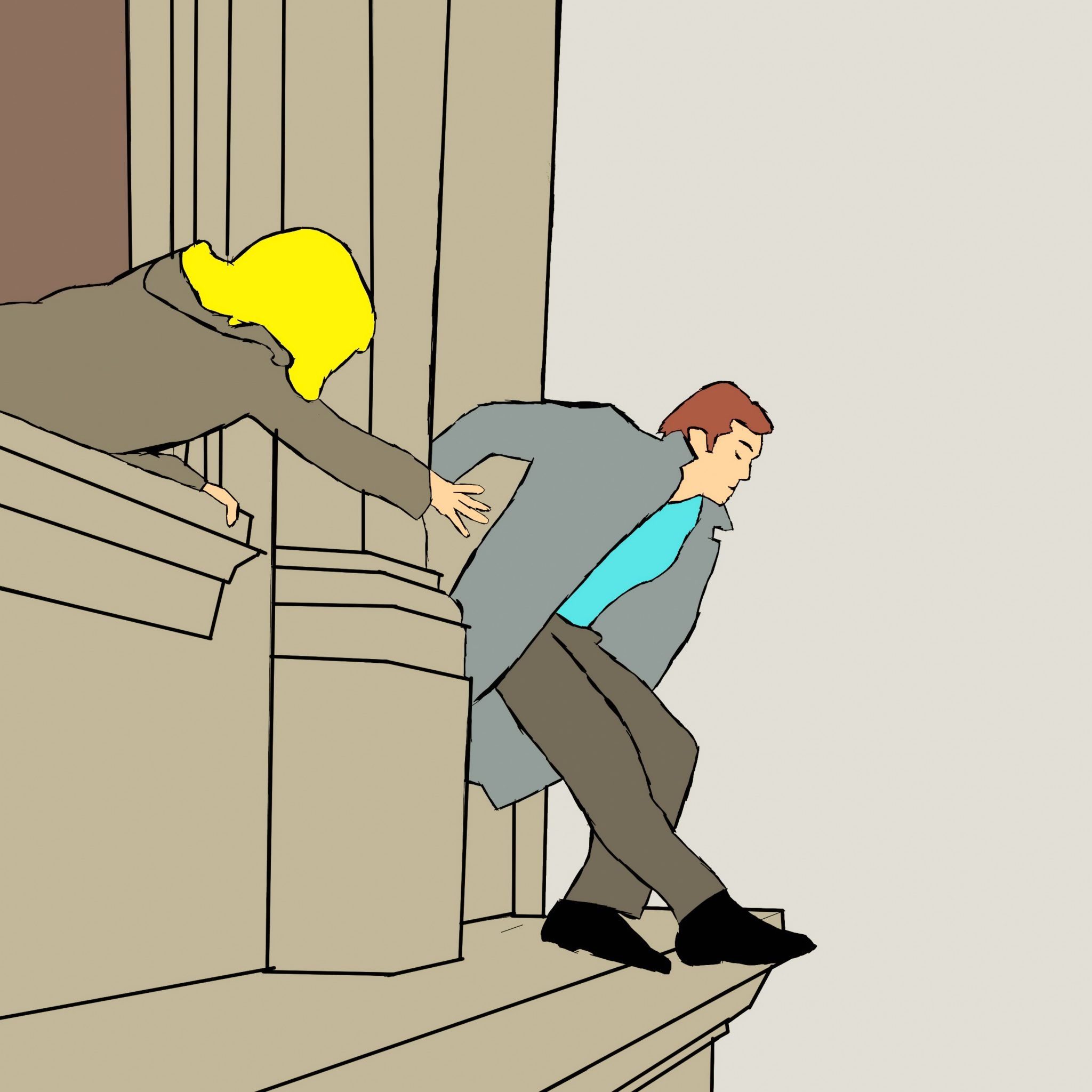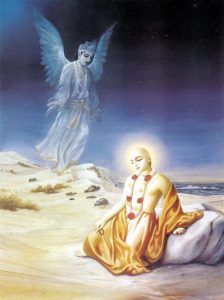
On another day, Śrīman Mahāprabhu suddenly said to Śrīla Sanātana Gosvāmī, “Acts such as suicide are steeped in the mode of ignorance. One can never attain kṛṣṇa-prema by committing suicide. Give up this ignorant idea and always engage in hearing (śravaṇa) and chanting (kīrtana). Very soon, you shall attain the wealth of kṛṣṇa-prema.”
Śrīla Sanātana Gosvāmī was amazed to hear the Lord’s words. “The all-knowing Śrīman Mahāprabhu disapproves of my intent to commit suicide,” he thought, “so He is forbidding me to do so.”
Śrīla Sanātana Gosvāmī asked the Lord, “What will You gain by keeping me alive?”
Śrīman Mahāprabhu replied, “You have surrendered to Me, and so now your body is Mine. Why do you want to destroy My property? Are you unable to discriminate between right and wrong? Your body is an important instrument through which I will accomplish many tasks. It is through you that I will elucidate the principles (tattvas) of the bhaktas, bhakti, and kṛṣṇa-prema; describe Vaiṣṇava duties and behaviour; excavate lost places of pilgrimage; and teach about renunciation. I want you to do all this in My dearmost abode, Mathurā-Vṛndāvana. “On the order of My mother, I am staying here in Nīlācala, and so I cannot go there to teach religious principles (dharma). I want to accomplish all these tasks through the medium of your body, and yet you want to give up that body. How can I tolerate this?”
haridāse kahe prabhu, — “śuna, haridāsa
parera dravya iṅho cāhena karite vināśa
parera sthāpya dravya keha nā khāya, vilāya
niṣedhiha iṅhāre, — yena nā kare anyāya”
Śrī Caitanya-caritāmṛta (Antya-līlā 4.87–88)
Śrīman Mahāprabhu said to Śrīla Haridāsa Ṭhākura, “Listen, Haridāsa, this Sanātana wants to destroy another’s property. One who is entrusted with another’s property does not embezzle or destroy it. Do not allow him to do such an unlawful thing.”
haridāsa kahe, — “mithyā abhimāna kari
tomāra gambhīra hṛdaya bujhite nā pāri
kon kon kārya tumi kara kon dvāre
tumi nā jānāile keha jānite nā pāre
etādṛśa tumi iṅhāre kariyācha aṅgīkāra
eta saubhāgya ihāṅ nā haya kāhāra”
Śrī Caitanya-caritāmṛta (Antya-līlā 4.89–91)
Śrīla Haridāsa Ṭhākura said, “My Lord, I falsely pride myself in knowing Your heart, but in truth, I am unable to understand Your deep intentions. No one can know Your works or through whom You accomplish them, unless You enlighten that person.”
(In contrast to ordinary conditioned souls, who become frustrated and envious upon hearing a great leader glorify someone of a lower rank, the open-hearted and virtuous Śrīla Haridāsa Ṭhākura said,) “O Lord, who can be so fortunate as to be accepted in the way You have accepted Sanātana?”
Śrīman Mahāprabhu embraced Śrīla Haridāsa Ṭhākura and Śrīla Sanātana Gosvāmī. He then left to bathe and perform other noontime duties. (Nāmācārya Śrīla Haridāsa Ṭhākura – His Life and Teachings)
Charles: Each country you go to has a different way of living, a different cultural heritage, and different  problems. How do you think your message will be geared towards South Africans?
problems. How do you think your message will be geared towards South Africans?
Śrīla Bhaktivedānta Nārāyaṇa Mahārāja: No matter which country I go to, I find that many people are wealthy, and they have big positions like chief ministers or advisors in the government. Despite having such good positions, however, they are desperately unhappy and many even commit suicide. Despite having vast wealth, large families, good positions in society, and great opulence, still they are not happy.
I tell people, “You cannot be happy by eating nicely and having nice clothing and possessions. Death comes to all, and with death comes so much suffering.” When people hear this from me, they develop faith and give up all bad habits like drinking, smoking, meat-eating, and taking garlic and onions.
I instruct them to chant the name of Kṛṣṇa, which is Kṛṣṇa Himself. There is no difference  between God and His names – Hare, Kṛṣṇa, and Rāma. His names are very powerful. In fact, Kṛṣṇa has invested all of His power, mercy, and qualities in these three names, or sixteen words [of the mahā-mantra]. Therefore, these names can do what Kṛṣṇa can do. They can give liberation and they can take us to Goloka Vṛndāvana. In Vṛndāvana, Kṛṣṇa will engage us in the service of Śrīmatī Rādhikā and Himself, and thus we will be happy forever.
between God and His names – Hare, Kṛṣṇa, and Rāma. His names are very powerful. In fact, Kṛṣṇa has invested all of His power, mercy, and qualities in these three names, or sixteen words [of the mahā-mantra]. Therefore, these names can do what Kṛṣṇa can do. They can give liberation and they can take us to Goloka Vṛndāvana. In Vṛndāvana, Kṛṣṇa will engage us in the service of Śrīmatī Rādhikā and Himself, and thus we will be happy forever.
Everyone who meets me and begins chanting the names of Kṛṣṇa says the same thing: “By chanting I am happier than ever before.” We find this in all countries, including America, South America, Malaysia, Australia, Russia, and China. In fact, we find that in Russia and China people are more receptive than in most other countries. So many people have come to me. I have made many of them full-time celibate monks, and now they are also travelling around the world and spreading this message.
Announcer: What is the importance of Indian Vedic dharma in today’s time?
Śrīla Bhaktivedānta Nārāyaṇa Mahārāja: Indian Vedic dharma is important at all times – those times that have passed and those times that are yet to come. Also at the present time, it is very important in complying with this Vedic dharma. In the world today, rich countries like America have also become fed up with wealth. Wealth is not getting them any happiness or peace. The highest rates of suicides are in these countries. In Russia and China also, suicide rates are very high. No one is happy.
If people of these countries accept Vedic culture, as they are now taking up as a result of preaching, they can live a happy life. They will have loving relationships with each other and will not waste their valuable time in fighting.
There is a prominent mantra in our Vedic culture:
īśāvāsyam idam sarvaṁ
yat kiñca jagatyāṁ jagat
tena tyaktena bhuñjīthā
mā gṛdhaḥ kasya svid dhanam
Śrī Īśopaniṣad (Verse 1)
The Supreme Lord is the controller and proprietor of all that is, of every animate and inanimate entity throughout creation. One should accept for himself what the Lord has given him as his share, and never try to take another’s portion.
There is only one Supeme Godhead. He is present in all living entities and is also in all moving and non-moving entities. Surrender everything unto Him. Do not be greedy for anyone’s wealth, belongings, land, or wife. This is the main reason for war and fighting. Our Gandhijī also understood this, and preached it everywhere.
Kamala-kānta dāsa: Śrīla Gurudeva, in the last two years a few devotees committed suicide. What is their destination? What is the future of souls who take their own lives?
Śrīla Bhaktivedānta Nārāyaṇa Mahārāja: Committing suicide is a sign that one has no belief in God. Such persons are like karmīs, materialists, who must enjoy or suffer the fruits of their material activities. One who believes in Kṛṣṇa would never commit suicide. Kṛṣṇa has given us this life for performing devotional activities in a mood of devotion (bhajana). If a person somehow gets a bonafide guru and good association but then neglects this opportunity by killing himself, he will be punished more than a person who commits suicide without having had such contact.
Śrīpāda Sajjana Mahārāja: What about the case of Mahāprabhu’s associate, Choṭa Haridāsa, who also took his own life?
Śrīla Bhaktivedānta Nārāyaṇa Mahārāja: This fact does not apply in his case, because he is an associate of Śrī Caitanya Mahāprabhu.*
* “Mahāprabhu only pretended to reject Choṭa Haridāsa, who was His eternal associate. Choṭa Haridāsa was a liberated soul. There was actually no offense on his part, but Mahāprabhu wanted to teach everyone by the example of this pastime. Mahāprabhu wanted to show that He cannot tolerate hypocritical behaviour” (Śrīla Bhaktivedānta Nārāyaṇa Mahārāja. Lecture in Italy, June 15, 2001).
Thus, Choṭa Haridāsa did not actually feel so dejected by being rejected by the Lord that he committed suicide. His so-called suicide was a magical arrangement by the Lord. Therefore he did not get a sinful reaction, as an ordinary person would have gotten for committing suicide – ed.
Śrīla Bhaktivedānta Nārāyaṇa Mahārāja: Śrīman Mahāprabhu loves all of His associates. Was Choṭā Haridāsa  not His associate? Did Mahāprabhu not have affection for him? According to outsiders, He rejected him, but later He was so anxious to see him that He would inquire, “Oh, what happened to Choṭā Haridāsa?” When someone finally informed Him that Choṭā Haridāsa had committed suicide in Prayāga, He simply remarked, “Oh well, good.” But then, as a Gāndharva, that same Haridāsa would secretly come and sing for Mahāprabhu. He had not rejected him after all.
not His associate? Did Mahāprabhu not have affection for him? According to outsiders, He rejected him, but later He was so anxious to see him that He would inquire, “Oh, what happened to Choṭā Haridāsa?” When someone finally informed Him that Choṭā Haridāsa had committed suicide in Prayāga, He simply remarked, “Oh well, good.” But then, as a Gāndharva, that same Haridāsa would secretly come and sing for Mahāprabhu. He had not rejected him after all.
To the eyes of outsiders, Śrī Rāmacandra banished Śrī Sītā-devī, but did He really reject her? There is no question of Him rejecting her; she is not someone to reject! If you have true love (prema) for someone, you can never leave them. Lust can easily be abandoned, but no one can possibly abandon aprākṛta prema, true spiritual love. Could Śrī Rāma leave Sītā? Could she leave Him? He simply staged her exile and then He waited for Her in Their spiritual abode.
Image/Art made possible by Pixabay.com & Krishnapath.org








